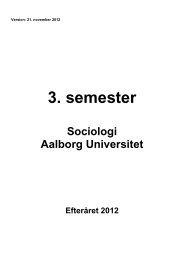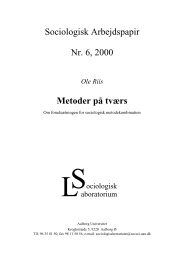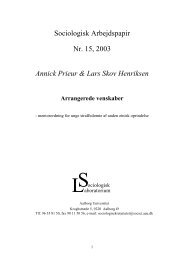Utopianism in the Work of Zygmunt Bauman - Sociologi - Aalborg ...
Utopianism in the Work of Zygmunt Bauman - Sociologi - Aalborg ...
Utopianism in the Work of Zygmunt Bauman - Sociologi - Aalborg ...
Create successful ePaper yourself
Turn your PDF publications into a flip-book with our unique Google optimized e-Paper software.
after his escape, read expell<strong>in</strong>g from, this regime <strong>in</strong> <strong>the</strong> late 1960’s could be<br />
<strong>in</strong>terpreted as a consequence <strong>of</strong> <strong>the</strong> disillusion hitt<strong>in</strong>g him hard when encoun-<br />
ter<strong>in</strong>g <strong>the</strong> reality <strong>of</strong> postmodernity <strong>in</strong> <strong>the</strong> West hold<strong>in</strong>g so much promise but<br />
be<strong>in</strong>g unable to deliver? Whe<strong>the</strong>r this is <strong>the</strong> case or not is difficult to determ<strong>in</strong>e<br />
but <strong>the</strong> fact rema<strong>in</strong>s that <strong>Bauman</strong> has not given up <strong>the</strong> hope that reality may be<br />
different from what is used to be and currently is.<br />
The socialist background, however, has been <strong>the</strong> bread<strong>in</strong>g-ground for<br />
many utopian thoughts throughout <strong>the</strong> last couple <strong>of</strong> centuries. <strong>Utopianism</strong> runs<br />
like a leitmotif through most socialist writ<strong>in</strong>gs (cf. Claeys 2000; Ulam 1973)<br />
and is even found implicitly <strong>in</strong> those writers blatantly denounc<strong>in</strong>g it. This so-<br />
cialist <strong>in</strong>cl<strong>in</strong>ation for utopian ideas may also be <strong>the</strong> reason beh<strong>in</strong>d <strong>Bauman</strong>’s<br />
predilection for his special variant <strong>of</strong> it despite consequently express<strong>in</strong>g an<br />
aversion towards <strong>the</strong> social experiments launched <strong>in</strong> <strong>the</strong> name <strong>of</strong> State Social-<br />
ism or structural Marxism. Back <strong>in</strong> <strong>the</strong> middle <strong>of</strong> <strong>the</strong> 19th century, Marx was<br />
angered by <strong>the</strong> so-called ‘utopian socialists’ who <strong>in</strong> <strong>the</strong>ir transcendental con-<br />
sciousness were world-weary and exhibited a starry-eyed attitude towards <strong>the</strong><br />
future horizons <strong>in</strong>stead <strong>of</strong> focus<strong>in</strong>g attention on <strong>the</strong> urgent and necessary task<br />
<strong>of</strong> br<strong>in</strong>g<strong>in</strong>g about real revolutionary change. His major attacks were directed at<br />
<strong>the</strong> anarchism and idealism <strong>of</strong> <strong>the</strong> likes <strong>of</strong> Proudhon and Bakun<strong>in</strong> as much as<br />
aga<strong>in</strong>st Owen and Fourier who with <strong>the</strong>ir utopianism all forfeited <strong>the</strong> chance <strong>of</strong><br />
mak<strong>in</strong>g <strong>the</strong> capitalist order crumble. <strong>Bauman</strong> is not so much angered as he is<br />
worried by <strong>the</strong> fact that apathy and a spectator attitude is <strong>the</strong> widespread re-<br />
sponse to <strong>the</strong> troubles and difficulties faced daily by <strong>the</strong> new hordes <strong>of</strong> down-<br />
trodden and marg<strong>in</strong>alised poor. Be<strong>in</strong>g spectators <strong>in</strong>stead <strong>of</strong> actors removes re-<br />
sponsibility, moral as well as political, for <strong>the</strong> actions and atrocities perpetrated<br />
aga<strong>in</strong>st <strong>the</strong>se groups <strong>of</strong> people (<strong>Bauman</strong> 1999, 2002:201ff). <strong>Bauman</strong>’s utopia is,<br />
as a consequence, a version <strong>of</strong> <strong>the</strong> republican society, relatively similar to that<br />
proposed by pragmatist Richard Rorty (1999) as a source for ‘social hope’,<br />
12










